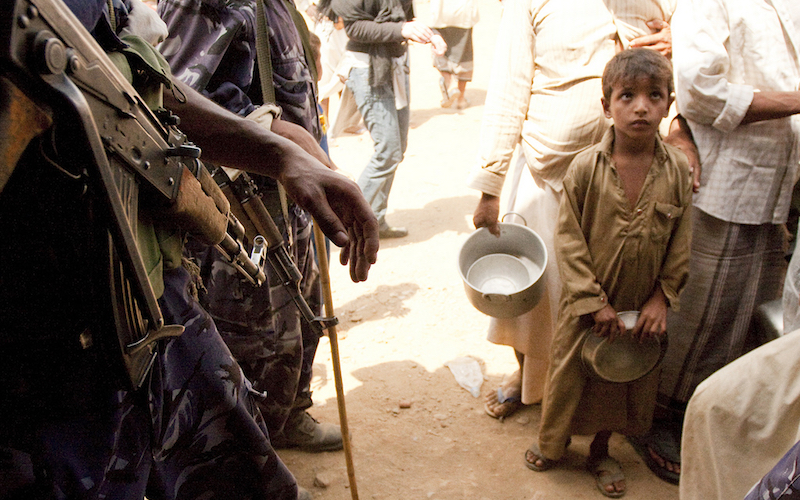“How’s this for a selfie?! Londoners of all faiths and backgrounds celebrating Eid in Trafalgar Square,” tweetedSadiq Khan, the Mayor of London, alongside a selfie with veteran TV presenter, Konnie Huq.
Khan, along with thousands others, thronged Trafalgar Square last week to share in the joy of the Muslim feast of Eid. This year’s celebration was even more exciting as it was filled with a variety of activities, bazaars, food festivals, art exhibitions, and different children’s activities. The festival was celebrated not only by Muslims, but also by people of different faiths. They were submerged in enjoyment and happiness, regardless of their religious beliefs.
Eid is indeed a moment of joy and happiness in Islamic traditions. But unfortunately, not everyone has the privilege of celebrating Eid with enjoyment. In other parts of the world, large numbers of people continue to struggle with a variety of problems due to the ongoing conflicts in their countries. Yemen is a prime example. Since 2014, Yemeni smiles have become increasingly wry as the conflict deepens between the country’s interim President, Abd Rabbuh Mansur Hadi, and the Houthi rebels.
The Houthis rejected Hadi’s decision to divide Yemen into six federal states and, as a result, war ensued. There are too many parties vying for attention in Yemen. The rebel Houthis are allied to the former President, Ali Abdullah Saleh. Their opponent is a Saudi-led military coalition comprised of different Arab governments, including some Gulf States, Morocco, Jordan, and others. Meanwhile, the US and the UK provide intelligence and logistics to the military coalition.
Frequently, these war actors bombard schools, destroy hospitals, devastate residential housing, disrupt markets, and even turn houses of worship into rubble. They do not care about the lives of the Yemeni people.
As witnessed throughout history, war is always detrimental to those who do not participate. In the context of Yemen, the worst consequences are faced by innocent individuals; those who have no interest in anything other than a peaceful life in their own homes without being forced to leave due to war. According to a UNHCR report published on 30 June, 178,720 people have been forced to leave Yemen to flee the seemingly endless conflict. Amnesty International recordedan even higher number, more than 2.4 million. These individuals have fled to various countries in the Middle East and East Africa. Oman, Saudi Arabia, and Sudan are among nations that have so far become major destinations for displaced citizens.
Many do not choose to flee to European countries, as is the case with Syrian refugees. This can be attributed to the fact that the distance between Yemen and Europe is great, unlike Syria, which borders Turkey. Journeys of thousands of kilometers are very risky. Moreover, fleeing to Europe incurs significant costs. Tickets costing hundreds of pounds are beyond the budgets of Yemenis; many of whom (47%)live on less than $2 per day.
Although some have managed to reach Europe, many remain stranded in Greece where their fates are unclear. Moving to other European countries, as some have from Syria, is very difficult due to the policies in those countries. Consequently, Yemeni refugees in Greece are faced with difficult choices; remain in unfriendly Greece or return to their war-torn homeland.
Both of these options carry potential risks. It is no secret that Greece has long struggled with a financial crisis that means it cannot provide suitable shelter nor employment to refugees. The country finds it hard to offer services to its native populations, let alone refugees.
The second option, returning to Yemen, is likely to be a death sentence. Sooner or later they will be killed by bullets or crushed under the wreckage of buildings hit by missiles. Their lives are of no value to those involved in the war. In excess of 3000 individuals have become victims of Yemeni war, including 700 children and 83% of the Yemenis are indire need of humanitarian aid, including food, water, shelter, and sanitation. Consequently, those who have become refugees are afraid to return to their homes.
Presently, Yemenis are likely to die slowly or live in poverty as a consequence of the ongoing war. Yemen ranks 11th among the most food insecure countries. One in three Yemenis live in a state of acute hunger. Half of children aremalnourished, and one in ten will die before the age of five. Should the refugees decide to return home, hunger and poverty will certainly increase.
The Yemenis who do not live in London could not celebrate Eid with the same euphoria and happiness as did those in London. The ongoing conflict battering their country has forced them to celebrate Eid amidst a sea of espionage, death and the rain of bullets.
Peace in Yemen should be on the agenda of the international community. Yemenis are entitled to celebrate Eid with a burst of laughter; just like those in Trafalgar Square.
This article is also published by International Policy Digest at: http://intpolicydigest.org/2016/07/14/eid-in-yemen-supposedly-as-joyful-as-in-trafalgar-square/

Comments
Post a Comment